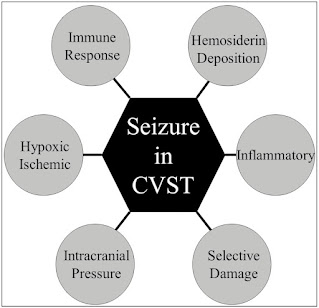Article type: Letter to Editor
Article
title: Pathophysiological
mechanism of seizure in cerebral venous sinus thrombosis
Journal: Medical
Journal of Babylon
Year: 2022
Authors: Jamir Pitton Rissardo, Ana Letícia Fornari
Caprara
E-mail: jamirrissardo@gmail.com
ABSTRACT
Cerebral venous sinus thrombosis (CVST) can present
with variable clinical manifestations such as headaches, unexplained altered
sensorium, focal neurological deficit, and subarachnoid hemorrhage. In this
context, the occurrence of seizures in CVST may adversely affect the prognosis
because they are correlated with high morbidity and mortality. In addition, the
mechanism of seizure in individuals with CVST is not clear, so the majority of
studies aimed at determining the potential risk factors for epileptogenesis. Herein,
we would like to discuss the pathophysiological mechanism of seizure in CVST. A
literature search was performed in Medline/Pubmed, on a set of terms that
included cerebral venous sinus thrombosis, seizure, and mechanism. The seizures
presented in CVST appear to have a different mechanism from those in
epilepsy-related stroke. This can be supported by the fact that some studies
showed a higher percentage of Todd’s paralysis and abnormal dynamic control of
intracranial pressure in CVST.
Keywords: Cerebral venous sinus
thrombosis, seizure, mechanism, risk factor, cerebral venous thrombosis,
thrombus
Full text available at:
DOI
10.4103/MJBL.MJBL_10_22
Citation
Rissardo
JP, Caprara AL. Pathophysiological mechanism
of seizure in cerebral venous sinus thrombosis. Med J Babylon 2022;19:299-300

